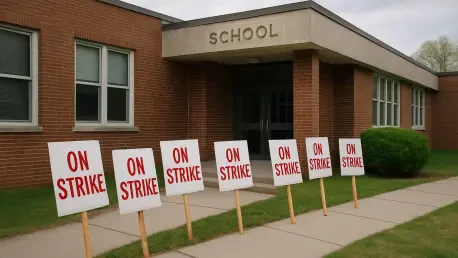In the heart of Tipperary, Ireland, a profound labor dispute has erupted, drawing attention to the plight of school secretaries and caretakers who are fighting for fair treatment, with up to 100 dedicated staff members, backed by the Forsa trade union, embarking on an indefinite strike. This action impacts over 70 schools across the county. Their primary grievance centers on the glaring absence of pension parity—a benefit long granted to other school employees like special needs assistants and secretaries in Education and Training Board (ETB) schools. This strike, marked by picketing outside schools and rallies in major cities like Dublin and Cork, underscores a deep-rooted frustration with systemic inequality. Beyond the immediate disruption to education, this strike raises critical questions about the recognition and valuation of non-teaching staff who play an indispensable role in school communities. Their struggle is not just for financial security but for acknowledgment of decades of service under unequal conditions.
Unveiling Decades of Inequality
The core of this dispute lies in a historical disparity that has left many school secretaries and caretakers in Tipperary without access to public service pensions, a privilege afforded to others in similar roles for over 40 years. Employees like Anne Ahearne, who has served 30 years at Ardfinnan National School, exemplify the personal toll of this exclusion. During economic downturns, these workers faced wage cuts akin to public servants, yet they were denied corresponding benefits like pension rights. This inconsistent treatment has fostered a sense of betrayal among staff who have dedicated their careers to supporting education. The frustration is palpable as they compare their situation to colleagues hired before the early 1980s or those in ETB schools who enjoy full pension entitlements. The strike is not merely a reaction to current policies but a demand to rectify a long-standing oversight that has marginalized a vital segment of the education workforce, leaving them vulnerable as they approach retirement.
Another dimension of this inequality is the emotional and financial strain it imposes on individuals who feel stranded by government inaction. Caroline Bolger, a secretary at Kilsheelan National School with 24 years of service, has voiced the isolation experienced by many in her position. The lack of pension security looms large for these workers, who often juggle essential administrative and maintenance duties with little recognition. Their roles, while not in the classroom, are critical to the smooth operation of schools, yet their compensation and benefits fail to reflect this importance. The disparity becomes even more stark when considering that some of their peers, due to arbitrary hiring dates or school types, have secured the benefits they are denied. This strike represents a collective stand against a system that has overlooked their contributions, pushing them to demand not just pensions but basic employment entitlements that align with their public service counterparts.
Community and Political Backing
The striking staff in Tipperary have found significant support from the wider community, highlighting the integral role they play in schools. Parents, families, and teaching staff have rallied behind the picket lines, showing solidarity with secretaries and caretakers who often serve as the backbone of educational institutions. This widespread backing reflects a shared understanding of the indispensable support these workers provide to principals, teachers, and students alike. Their absence during the strike has underscored how schools struggle to function without their daily contributions, from managing records to maintaining facilities. Community support is not just moral encouragement but a powerful statement that these employees deserve the same respect and benefits as other public service workers. The timing of the strike, at the start of a busy academic year, amplifies its impact, yet the consensus remains that such action is a necessary last resort for justice.
Political figures have also lent their voices to the cause, further legitimizing the demands of the striking workers. Deputy Michael Murphy, whose constituency office in Clonmel faced picketing, has publicly endorsed the campaign for pension parity. Drawing from his experience on a school board, he acknowledges the critical support these staff members offer and empathizes with the difficulty of striking during a pivotal time. His advocacy includes a call for swift resolution, urging the Minister for Public Expenditure to address the issue through mechanisms like the Workplace Relations Commission or the Labour Court if needed. This political support underscores the urgency of correcting historical inequities and ensuring that non-teaching staff receive fair treatment. The alignment of community and political perspectives strengthens the case for immediate action, framing the strike as a broader fight for equity within the education sector rather than an isolated labor dispute.
Path Toward Resolution and Recognition
Looking back, the strike by Tipperary school staff emerged as a poignant reminder of the persistent inequalities faced by non-teaching employees in the education system. The personal stories of long-serving workers like Anne Ahearne and Caroline Bolger brought to light the emotional and financial burdens carried for decades without pension security. Their determination, supported by the Forsa trade union, galvanized a movement that exceeded expectations in its scale and impact. The collective action not only disrupted over 70 schools but also drew significant attention to a systemic flaw that had been ignored for too long. Community and political endorsements, including from figures like Deputy Michael Murphy, validated the legitimacy of their claims and amplified the call for fairness.
Moving forward, the resolution of this dispute hinges on actionable steps by government bodies to grant pension parity and address other employment entitlements. Engaging with established labor resolution platforms offers a viable path to negotiate terms that honor the contributions of these essential workers. Beyond immediate benefits, there must be a broader commitment to re-evaluate how non-teaching staff are valued within the education framework. Ensuring that such disparities do not recur requires policy reforms that prioritize equity across all roles in schools. The momentum generated by this strike should serve as a catalyst for systemic change, guaranteeing that future generations of school staff are not left marginalized. This moment stands as an opportunity to redefine recognition and support for those who sustain the backbone of educational communities.









